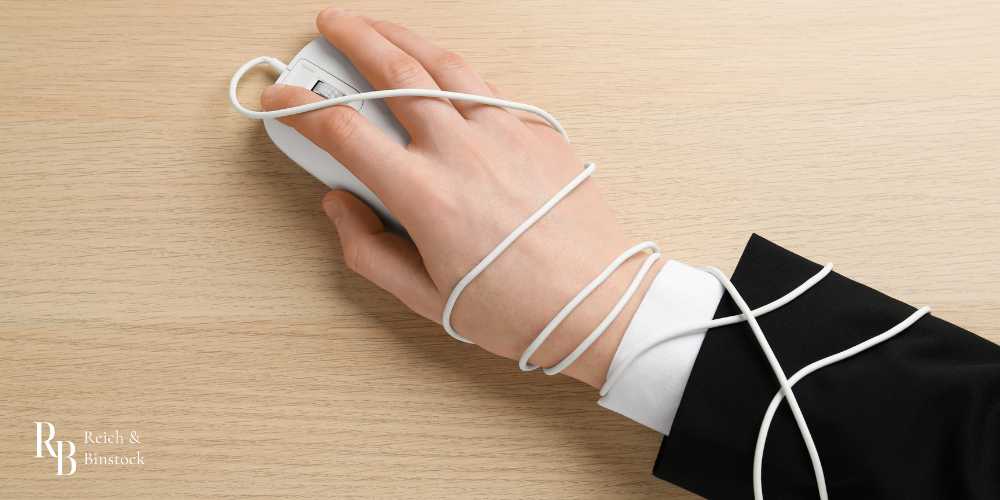Internet addiction, characterized by excessive internet use that impairs mental health, is increasingly recognized as a genuine concern. As individuals spend more hours online, the line between productive internet use and being addicted to the internet becomes blurred, leading to what many experts now classify as internet addiction disorder. If you or someone you know is struggling with the consequences of being addicted to the internet, it is crucial to seek professional help.
Contact Reich & Binstock‘s personal injury attorneys in Houston, TX, who can provide the necessary support and guidance to address the legal aspects of internet addiction disorder and protect your well-being. Call (713) 622-7271 or complete our online contact form to schedule a free consultation today.
What Is Internet Addiction Disorder?
Internet Addiction Disorder is a condition marked by excessive and problematic internet use that leads to mental health problems. Being addicted to the internet and being chronically online means the same thing in many circumstances.
This disorder is characterized by an addictive behavior where individuals develop an internet dependence, spending vast amounts of time online to the detriment of their personal, social, and professional lives.
Common manifestations of this disorder include online gaming addiction and compulsive internet activities. Continuous and unchecked internet use can severely impact daily functioning and overall well-being.
Internet Addiction Disorder vs Impulse Control Disorder
Internet Addiction Disorder and Impulse Control Disorder are both characterized by difficulty in regulating behaviors, but they manifest differently.
Internet Addiction involves excessive internet use, where individuals may lose control over how much time they spend online, often leading to significant lifestyle disruptions.
Impulse Control Disorders refer to a broader range of behaviors where a person fails to resist urges that could be harmful to themselves or others, such as kleptomania or pyromania.
Both can exist as co-occurring disorders, complicating the diagnosis and treatment process, as each feeds into the cycle of compulsive behavior.
Internet Addiction Statistics
While the Diagnostic and Statistical Manual of Mental Disorders has yet to classify internet addiction as an official mental health condition, growing evidence suggests that internet dependency and problematic internet usage are emerging as significant concerns.
Studies indicate that a substantial number of internet users exhibit behaviors typical of a mental disorder due to their online habits. However, more research is needed to define and diagnose internet addiction accurately, as well as to understand its prevalence and impact.
Current statistics vary widely, reflecting the ongoing debate and the need for a standardized approach to identify and manage this modern health issue.
Is Internet Addiction Real?
Although not officially classified as a mental illness in diagnostic manuals, internet addiction is increasingly being recognized as a real addiction, similar to substance-related disorders such as alcohol abuse.
This type of mental illness manifests in various forms, including internet gaming disorder, computer addiction, cyber relationship addiction, and cybersex addiction.
Individuals suffering from these internet addictions experience significant negative consequences in their personal, social, and professional lives, similar to those experienced by people with more traditional addictions.
Signs of Internet Addiction
Signs of online addiction and symptoms of social media addiction can manifest through various online behaviors and emotional responses.
Individuals addicted to the internet often excessively engage in activities online. They may also develop deep emotional attachments to online relationships.
Withdrawal symptoms are a key indicator, with users experiencing negative emotions like anxiety, sadness, or irritability when unable to access the internet. This addiction is evident when internet use overtakes other important aspects of life, leading to personal, social, or professional disruptions.
Compulsive Internet Use
Compulsive use of the internet is a behavioral concern where individuals feel an overwhelming urge to engage with digital content continuously.
This compulsivity often resembles aspects of Obsessive-Compulsive Disorder and is marked by excessive time spent on social networking sites, chat rooms, adult websites, and playing online games.
The repetitive, habitual nature of logging on and interacting online, even when it yields no personal or professional gain, emphasizes the compulsive pattern associated with problematic internet use.
Internet Addiction Test
Young’s Internet Addiction Test is one of the most utilized tools for assessing the severity of Internet Addiction Disorder.
This test typically consists of a series of questions focusing on the individual’s internet use patterns, emotional attachment to online activities, and the impact of the internet on their daily lives.
Participants are asked to reflect on their previous online activity, the amount of time spent in an online session, and their emotional responses to being offline.
The test helps determine the extent of one’s dependency on the internet, providing insights into potential behavioral interventions needed to manage this growing concern.
Causes of Internet Addiction
The causes of internet dependence are often rooted in the psychological and emotional gratifications provided by the internet.
Chat rooms and online dating offer escape and instant gratification that can lead to compulsive use. Similarly, the excitement and risk of online gambling or the thrill of bidding in online auctions can result in addictive behaviors. Obsessive computer game playing can also contribute to addiction, as individuals can easily become deeply engrossed in virtual realities, preferring them over real-world interactions.
These online activities can contribute to the development and perpetuation of internet addiction disorder.
What Are the Effects of Internet Addiction?
There are numerous negative effects of social media, computer addiction, and digital addiction, in general. Internet addiction disorder can have profound effects on both mental and physical health. As individuals spend excessive amounts of time web surfing and accessing online content, they may experience significant disruptions in sleep patterns, personal relationships, and work or school responsibilities.
The constant need for internet access can lead to withdrawal symptoms such as irritability, anxiety, or depression when the internet is unavailable. Internet addiction often coexists with other mental health problems, exacerbating symptoms and complicating treatment strategies.
How to Stop Internet Addiction in Texas
To combat online addiction, implementing restricted internet use can be an effective strategy. This involves setting clear and enforceable limits on the amount of time spent online each day. Family members can play a crucial role in this process by providing support and accountability.
Engaging in family therapy can also be beneficial, as it helps address underlying issues and improves communication among all members.
This approach ensures that the individual struggling with internet addiction receives consistent support while learning to moderate their internet habits.
Internet Addiction Treatment Options
The treatment of internet addiction often combines psychological and physical interventions to address both the mental and physical aspects of the addiction.
Group mental therapy is a common treatment option, providing a supportive environment where individuals can share experiences and develop coping strategies under professional guidance.
Addiction medicine may also be prescribed by healthcare professionals to address any underlying psychological issues or withdrawal symptoms associated with pathological internet use.
Sports exercise prescriptions are also helpful, as physical activity has been shown to reduce symptoms of depression and anxiety and can help re-establish healthy habits. For social users, a dopamine detox social media option may be a successful treatment for internet addiction.
These treatment options work together to help individuals regain control over their internet use and improve overall well-being.
Internet Addiction Treatment Centers
Internet addiction treatment centers offer specialized programs designed to address the unique challenges posed by excessive online activity.
These centers typically utilize a combination of addiction treatment methods including group therapy and cognitive behavioral therapy (CBT), which are integral to helping individuals understand and modify their online patterns.
Types of Internet Addictions
Social Media Addiction
Social media addiction is a growing problem among internet users, with many becoming dependent on social networking sites like Facebook, Instagram, and TikTok for validation and entertainment. Those addicted to the internet often experience social media withdrawals, including anxiety, irritability, and restlessness when unable to check notifications. Overuse of these platforms can lead to mental health struggles, decreased productivity, and even legal issues related to online behavior. Many social networking victims suffer from cyberbullying, privacy violations, or reputational damage due to excessive online exposure. For those facing serious consequences, social media addiction lawyers in Houston can provide legal guidance on digital disputes, defamation, or cyber harassment. Seeking addiction treatment and implementing a structured digital detox can help individuals regain control and establish healthier online habits.
Addiction to Online Games and Gambling
Addiction to online gaming and gambling has become a significant issue, with many individuals developing compulsive internet use. Computer gaming addiction can lead to excessive or pathological internet use, social isolation, and neglect of responsibilities, while online gambling addiction often results in financial distress and mental health disorders. Both forms of digital addiction are fueled by instant rewards and dopamine-driven engagement, making it difficult for individuals to stop. For those facing legal or financial consequences due to their addiction, a Houston gaming addiction lawyer can provide guidance on issues such as gambling debts, fraud, or gaming-related disputes. Seeking professional help and setting boundaries can be crucial steps toward overcoming gaming and gambling addiction.
Online Dating Addiction
Online dating addiction is a growing issue where internet users become excessively reliant on dating apps and virtual relationships, often leading to compulsive swiping, chatting, and unrealistic relationship expectations. This addictive behavior can escalate into cybersex addiction, where individuals prioritize online intimacy over real-world connections, further reinforcing their dependence on digital interactions. Many who are addicted to the internet for romantic validation may struggle with self-esteem, social isolation, and difficulty forming meaningful offline relationships.
Houston Internet Addiction Lawyers
If you believe that your internet addiction disorder has legal implications, or if you’ve suffered harm due to negligent digital practices, Reich & Binstock is here to help.
Our experienced Houston defective product lawyers are dedicated to providing personalized, effective legal strategies to protect your rights and ensure you receive the justice you deserve.
Contact us online to schedule a free consultation and take the first step toward resolving your issues with the support of trusted legal professionals.
















